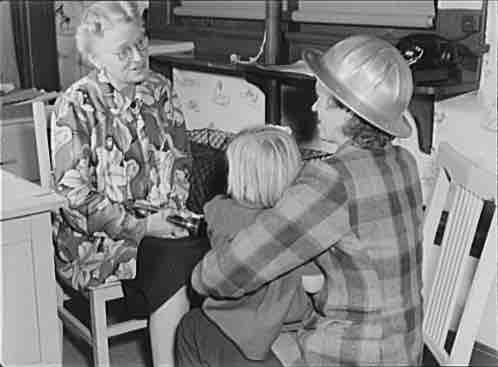Day care is the care of a child during the day by a person other than the child's legal guardians, typically performed by someone outside the child's immediate family. Day care is typically a service during specific periods, such as when parents are at work . Child care is provided in nurseries or crèches, or by a nanny or family child care provider caring for children in their own homes. It can also take on a more formal structure, with education, child development, discipline, and even preschool education falling into the fold of services.

Day Care
A mother who works in construction drops her child off at daycare prior to work.
The day care industry is a continuum from personal parental care to large, regulated institutions. The vast majority of childcare is still performed by the parents, in house nanny, or through informal arrangements with relatives, neighbors, or friends. Another factor favoring large corporate day cares is the existence of childcare facilities in the workplace. Large corporations will not handle this employee benefit directly themselves and will seek out large corporate providers to manage their corporate daycares. Most smaller, for-profit day cares operate out of a single location.
Independent studies suggest that good day care for non-infants is not harmful. Some advocate that day care is inherently inferior to parental care. In some cases, good daycare can provide different experiences than parental care does, especially when children reach two and are ready to interact with other children. Bad day care puts the child at physical, emotional, and attachment risk. Higher quality care is associated with better outcomes. Children in higher quality child care had somewhat better language and cognitive development during the first 4½ years of life than those in lower quality care. They were also somewhat more cooperative than those who experienced lower quality care during the first three years of life.
As a matter of social policy, consistent, good daycare may ensure adequate early childhood education for children of less skilled parents. From a parental perspective, good daycare can complement good parenting. Early childhood education is the formal teaching and care of young children by people other than their family in settings outside of the home. "Early childhood" is usually defined as before the age of normal schooling - five years in most nations, though the U.S. National Association for the Education of Young Children (NAEYC) instead defines "early childhood" as before the age of eight.